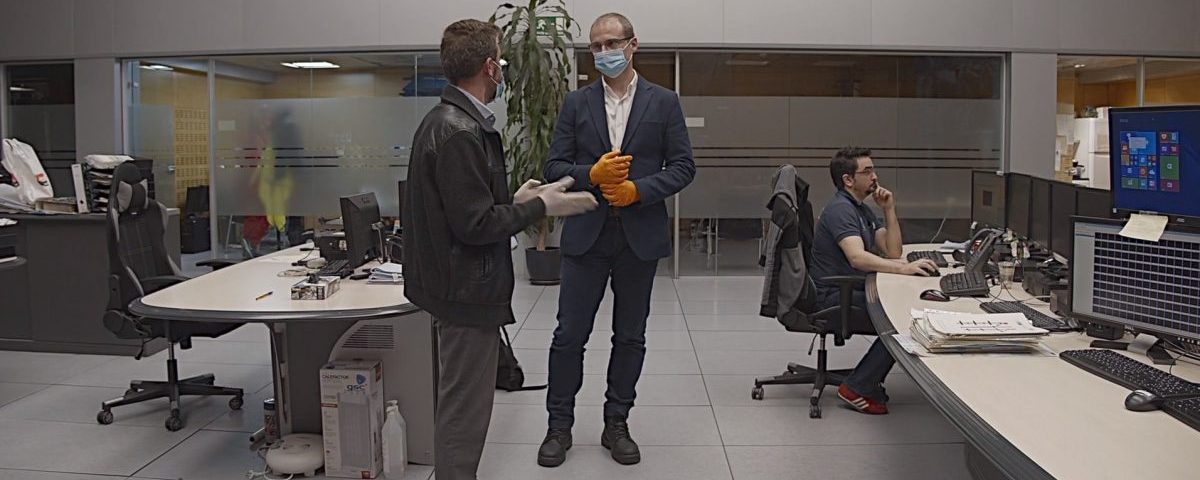
After five weeks of lockdown, it is strange and comforting to go to an in-person meeting, accompanying Fidel López Soria, CEO of Ferrovial Services, to the Calle 30 control center, which manages the largest network of urban tunnels in Europe. We take advantage of the proximity of World Day for Safety and Health at Work to learn about his vision of workplace safety as a “priority objective in each and every one of our contracts and workplaces.” The video below summarizes the conversation with Fidel, and it is followed by the full transcript.
What does the COVID-19 pandemic mean for Ferrovial Services?
First of all, I would like to express my condolences for all the loved ones we have lost in the past few weeks, including several of our colleagues. Also my appreciation and gratitude to all the staff of Ferrovial Services for the extraordinary commitment we are demonstrating as a company that delivers services that are vital for society, such as street cleaning, waste collection and treatment, road and facility maintenance, and energy efficiency management, and particularly all those who have been working in the front line to contain the disease: ambulance services, medical emergencies and home telecare, hospital cleaning and maintenance, emergency call handling, and processing medical waste, which has multiplied exponentially. We can be very proud of the essential work that thousands of our colleagues are doing to prevent the collapse of our healthcare system.
Why is workplace safety gaining in importance in a business setting?
Our top priority is to keep our co-workers safe and protect everyone who uses our services. Getting home safe and sound is the primary objective of the work day. In recent years, we have enhanced safety across the board in all the geographies where we operate and have managed to reduce all accident rates substantially, but we should never be complacent, since we are dealing with that matters most: people’s health and lives.
Can you quantify the objectives?
People are the principal asset at Ferrovial Services. So the only possible objective is zero accidents. In other words, we want to develop a culture of zero tolerance of situations that might produce accidents, at each and every one of our workplaces. We must take precautions, anticipate, and prevent accidents from happening.
What approach is needed to create safer workplaces?
Firstly, we must foster leadership. We must all take care of each other and take responsibility. Safety is the first item on the agenda of every management committee meeting, and each member has made individual commitments in this connection. But leadership must be present at all levels of the organization. Each employee has a responsibility to stop the job if the conditions are unsafe, and to contribute to achieving the highest standards of safety in all our contracts. It’s important to control risks, to learn lessons from every incident, to take preventive measures and to assess the risks involved in every job. I mean that in a broad sense, including such aspects as mental health and healthy lifestyle habits. Thirdly, lifelong learning is vital in order to achieve excellence and maximize competency. And last, but by no means least, commitment and awareness-raising are vital to turn every workplace into a space for learning and best practices.
What are the specific risks in road maintenance?
It’s a risky job involving dangerous situations, for example, when there is an accident or when upgrading the pavement without closing the road to traffic. Our employees’ safety depends not only on their own decisions, but also on the behavior of the drivers who are using the infrastructure. Consequently, we must take every possible precaution.
Can you give an example of how those risks can be addressed?
We are involved in road maintenance in every geography where we operate, and for years we have been learning from best practices in the various countries. A good example of a comprehensive approach to safety is +VIAL, a program under way in Spain with a multidisciplinary team that is working in three areas: training, in the broadest sense, ranging from using virtual reality to recreate situations of risk, to daily meetings before work commences on a contract. Another is control and oversight, in which we audit performance, certify our suppliers, conduct inspections, and standardize procedures. The third area involves institutional cooperation, working proactively with all players with the common goal of raising technical standards in this industry.
Isn’t innovation a strategic priority in this area?
By innovation, we mean the application of new ideas and new approaches. Accountability by multidisciplinary teams and importing best practices are also ways to introduce innovation. Evidently, new technologies can enable us to make huge leaps forward. For example, using sensors and wearables to warn of danger, vehicles that automate tasks so that workers do not have to expose themselves to risk, and active safety systems in fleets of smart vehicles. We must evidently rely on new technology, but it’s also vital to develop a culture in which safety is embedded as an intrinsic factor in everything the company does.
To conclude, what would you like to highlight on World Safety Day?
It’s important to raise awareness about this vital issue, and to encourage a multicultural dialog and the adoption of new practices. We must think in the short, medium and long term, and understand that every day should be a day of safety and health at work. I am proud to belong to a great team of professionals, one with an evident commitment to society. We should be grateful for the extraordinary work that we are doing during this crisis, from which I am convinced we will emerge stronger. We hope to leave this situation behind us very shortly, and to return to what is already being referred to as the new normal: work and personal life after the pandemic.





There are no comments yet